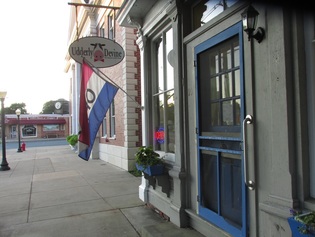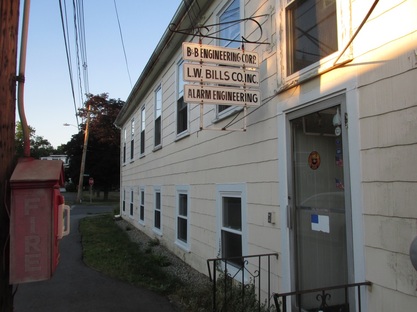
I want to see small businesses thrive. I wander the streets of Georgetown, Ma., reading the stenciled names on big buildings that are shedding paint like annual fur, and I wonder how many of them are still actual businesses. The engineering place--”B&B Engineering Corp: Alarm Engineering”--across the street from the library is in a huge white building that is overflowing with what looks like junk in the form of old-school fire alarms—like a hoarder's closet, or something that has been lost and fallen into shadows.
There are plenty of small businesses around—the ice cream shop “Udderly Divine”, and the local breakfast place with its giant mug out front “Theo's.” And there are upscale places too, like “The Spot” which gleams like the chrome on a new motorcycle and has menu prices that would make a Bostonian feel right at home.
One day, when the library was closed on a day that I'd forgotten about I decided to walk about and see if there was a cafe nearby that I hadn't noticed.
So, shouldering my backpack, I walked past the dilapidated engineering building, past Udderly Divine in the square, and down toward Town Hall, where Pomodori, a sandwich and sub place with too many options and a lot of available seating, stood. I went inside. If worst came to worst, I could sit in here and write...but I would feel guilty not buying anything. And although the menu is extravagant, it doesn't sell anything like tea or hot chocolate, and the walls are so bright it's almost an affront to taint the premises for too long. So I stopped to talk to the girls behind the register, who were milling about in mutual boredom as they waited for people to come in and order something in this town of 8,183 people.
“Do you know if there's a cafe around here?” I asked the girl closest to me. “I don't mean the Dunkin Donuts or Honey Dew--” I said, naming the chains on the other side of downtown, a five minute walk west, “--I'm talking a real cafe, where people can sit and write and stuff.”
She shook her head slowly, and the girl behind her, with a bit of bite to her words flipped her long hair back and said, “We have three ice cream shops, five pizza places, and a grocery store and that's it.” I could feel the venom in her words, the utter frustration that she and her friends must feel all the time, in their car-less, localized lives.
Another time, while shopping in the next town over at the Rowley Market Basket (it's the cheapest grocery store around) I asked the checkout girl, another teenager, if she would go to a Rowley cafe, and she said, “Oh my god, definitely.” She seemed so excited by the idea, that I wonder if she'd chosen to work at the grocery store for a bit of entertainment in this town of the elderly.
I can imagine older folks worrying that younger people won't stick around—they're already dying to hop in a car and go, go, go. This happened with me, even—I flew the coop as soon as I could, took my car and hightailed it to western mass, and then to the real west, out to Idaho and Wyoming and Colorado. What I saw there both scared and enlightened me. The rows upon rows of strip malls and chain restaurants was suffocating, a blemish on the otherwise magnificent horizon of mountains and Indian Paintbrush clouds. But in downtowns I became acquainted with easy-going bookstores and cafes and even restaurants—places I'd never heard of before, that let people linger.
Back home, in Massachusetts, I'd grown used to cramped quarters where diner waitresses glared at people who overstayed their welcome, and a plethora of businesses bare signs that read: “Bathrooms for customers only,” as though only those with a dollar were worth a potential plumbing issue. Almost everyone in my graduating class from Essex Aggie High School works for a major corporation in some way. My best friend adjuncts for colleges, and her husband works for the major engineering enterprise in Gloucester, once known as Varian, then bought out a few years ago by Applied Materials. My aunt works there too. It provides tons of jobs for those local and distant.
But I want to start something. I want to bring a little bit of Colorado home with me in the form of a late-night cafe that serves coffee and wine and pastries and sandwiches, and offers dancing and music on certain nights, family game nights and maybe even a D&D night. I don't know anyone personally who has tried such a thing. I know a woman who runs a doggie daycare, and another who started her own service dog project, and my dad started his own business selling cars years and years ago. But none of them ever began with the amount of overhead that I would need to start out.
My vision is thus explained, but not necessarily clear or achievable as yet.
But I keep coming back to the things I loved about Colorado: blues dancing, hiking, and house parties. Except for solo hikes, it all comes back to community. If I start community in a place where people are dying for one, then maybe it will work out. If nothing else, these teenagers who are trying to study and stay away from home for as long as possible might find a way to be able to afford a coffee and maybe a sandwich or cookie from the new cafe they've discovered just down the street from the library. But maybe I'm looking too close into it; maybe I need to veer away from the mentality that if I plant it, the rains will come.
Wasn't that how so many farmers lost their livelihoods out west? By believing that the rain follows the plow? Or maybe this is what need feels like--a gaping hole searching for closure. Aren't marketers always talking about how we need to find what customers want, and then show them why they need it? What if my cafe is the answer?
There are plenty of small businesses around—the ice cream shop “Udderly Divine”, and the local breakfast place with its giant mug out front “Theo's.” And there are upscale places too, like “The Spot” which gleams like the chrome on a new motorcycle and has menu prices that would make a Bostonian feel right at home.
One day, when the library was closed on a day that I'd forgotten about I decided to walk about and see if there was a cafe nearby that I hadn't noticed.
So, shouldering my backpack, I walked past the dilapidated engineering building, past Udderly Divine in the square, and down toward Town Hall, where Pomodori, a sandwich and sub place with too many options and a lot of available seating, stood. I went inside. If worst came to worst, I could sit in here and write...but I would feel guilty not buying anything. And although the menu is extravagant, it doesn't sell anything like tea or hot chocolate, and the walls are so bright it's almost an affront to taint the premises for too long. So I stopped to talk to the girls behind the register, who were milling about in mutual boredom as they waited for people to come in and order something in this town of 8,183 people.
“Do you know if there's a cafe around here?” I asked the girl closest to me. “I don't mean the Dunkin Donuts or Honey Dew--” I said, naming the chains on the other side of downtown, a five minute walk west, “--I'm talking a real cafe, where people can sit and write and stuff.”
She shook her head slowly, and the girl behind her, with a bit of bite to her words flipped her long hair back and said, “We have three ice cream shops, five pizza places, and a grocery store and that's it.” I could feel the venom in her words, the utter frustration that she and her friends must feel all the time, in their car-less, localized lives.
Another time, while shopping in the next town over at the Rowley Market Basket (it's the cheapest grocery store around) I asked the checkout girl, another teenager, if she would go to a Rowley cafe, and she said, “Oh my god, definitely.” She seemed so excited by the idea, that I wonder if she'd chosen to work at the grocery store for a bit of entertainment in this town of the elderly.
I can imagine older folks worrying that younger people won't stick around—they're already dying to hop in a car and go, go, go. This happened with me, even—I flew the coop as soon as I could, took my car and hightailed it to western mass, and then to the real west, out to Idaho and Wyoming and Colorado. What I saw there both scared and enlightened me. The rows upon rows of strip malls and chain restaurants was suffocating, a blemish on the otherwise magnificent horizon of mountains and Indian Paintbrush clouds. But in downtowns I became acquainted with easy-going bookstores and cafes and even restaurants—places I'd never heard of before, that let people linger.
Back home, in Massachusetts, I'd grown used to cramped quarters where diner waitresses glared at people who overstayed their welcome, and a plethora of businesses bare signs that read: “Bathrooms for customers only,” as though only those with a dollar were worth a potential plumbing issue. Almost everyone in my graduating class from Essex Aggie High School works for a major corporation in some way. My best friend adjuncts for colleges, and her husband works for the major engineering enterprise in Gloucester, once known as Varian, then bought out a few years ago by Applied Materials. My aunt works there too. It provides tons of jobs for those local and distant.
But I want to start something. I want to bring a little bit of Colorado home with me in the form of a late-night cafe that serves coffee and wine and pastries and sandwiches, and offers dancing and music on certain nights, family game nights and maybe even a D&D night. I don't know anyone personally who has tried such a thing. I know a woman who runs a doggie daycare, and another who started her own service dog project, and my dad started his own business selling cars years and years ago. But none of them ever began with the amount of overhead that I would need to start out.
My vision is thus explained, but not necessarily clear or achievable as yet.
But I keep coming back to the things I loved about Colorado: blues dancing, hiking, and house parties. Except for solo hikes, it all comes back to community. If I start community in a place where people are dying for one, then maybe it will work out. If nothing else, these teenagers who are trying to study and stay away from home for as long as possible might find a way to be able to afford a coffee and maybe a sandwich or cookie from the new cafe they've discovered just down the street from the library. But maybe I'm looking too close into it; maybe I need to veer away from the mentality that if I plant it, the rains will come.
Wasn't that how so many farmers lost their livelihoods out west? By believing that the rain follows the plow? Or maybe this is what need feels like--a gaping hole searching for closure. Aren't marketers always talking about how we need to find what customers want, and then show them why they need it? What if my cafe is the answer?

 RSS Feed
RSS Feed
